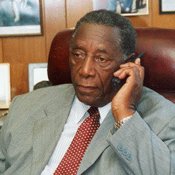Charles Evers is a Republican Barack Obama supporter. A radio talk show host and the manager of WMPR 90.1 FM, a local blues and gospel radio station, Evers has lived here since 1963, when his brother, civil rights leader Medgar Evers, was shot and killed. Like many other veterans of the Civil Rights Movement all across the country, he was thrilled about the election of soon-to-be president Barack Obama.
"There are no words that can say how proud I am, because (Obama) was elected by America. It wasn't done by white folks or black folks or Hispanics. He was elected by America, and I thank God for that," he said Monday.
When considering the unique diversity of Obama's supporting electorate, one should look no further than Evers himself. Though he, too, has been a civil rights activist, he has been a Republican since the Reagan administration. Like many of his fellow party members, he's not too happy about the current state of the GOP. To provide a visual of the newfound Republican weakness, look no further than the laminated list of pictures of America's past presidents in Evers' office in Southwest Jackson. Carefully taped at the bottom, next to George W. Bush's cheeky grin, is Obama's mug.
"The Republican Party has got to become the party of everybody else. It can't be the party of the old, white male," Evers said. "Forty-three presidents. All old white men. That's got to change. We've got to reach out and be more inclusive. Not even white women have a chance in the Republican Party, let's face it."
An increased inclusiveness is also the passion of Susan Glisson, director of the William Winter Institute for Racial Reconciliation based at the University of Mississippi in Oxford. Glisson's program, designed in part by Jackson lawyer and former governor William Winter, facilitates community organizing projects throughout the state, particularly in areas with a history of racial tension.
"Psychologically, [the election] communicates to people who have been marginalized and discriminated against that it's a new day, and there are new opportunities and correspondingly new expectations,"Glisson said. "Obama's story is quintessentially an American one: He worked hard, he got an education, and he became president of the United States. That is a narrative that has only actually described a few of our presidents. But now it could describe anyone."
Glisson, who supports area communities with the help of two professional staffers and several student interns (which this reporter used to be), said she hopes the increased volume of voices for and against Obama will lead only to a more frank discussion of race in Mississippi.
"We dance around (race) too often. It's hard to get to the depth of what the problem might be because we don't have very honest conversations."
James Meredith, a Jackson resident who famously integrated the University of Mississippi through his riot-causing enrollment in October 1962, declined to elaborate on the significance of Obama's election and which candidate he supported. He did tell the Jackson Free Press in September that Obama was "the smartest person ever come into the world" (other than James Meredith).
"I have only talked to two people in America about this topic at all, and I haven't talked to anyone in America since after the election," Meredith said, referring to the Jackson Free Press and The Daily Mississippian, the student paper at the University of Mississippi. "I think this is a very important time in the history of Western Christian civilization. I'm sure you're familiar with my history. I just think this is too important to make a casual comment about."
For civil rights leaders like Evers, the importance of this historic moment lies in what Obama's election means in the context of the Civil Rights Movement.
"We were so proud that Medgar and many others, white and black, fought and died to get us this far. And to know that our country now has seen that it can be done, by unifying, cooperating, and accepting someone for who he or she may be. It brings tears to my eyes."
Glisson points out that Americans shouldn't fall for the trap that Obama's election somehow closes a chapter of racial discourse.
"Poverty lingers in this country. Discrimination that is too often based on race lingers in this country," she said. "We should take a moment to celebrate. But we should also take a moment to renew our commitment.



Comments
Use the comment form below to begin a discussion about this content.
comments powered by Disqus